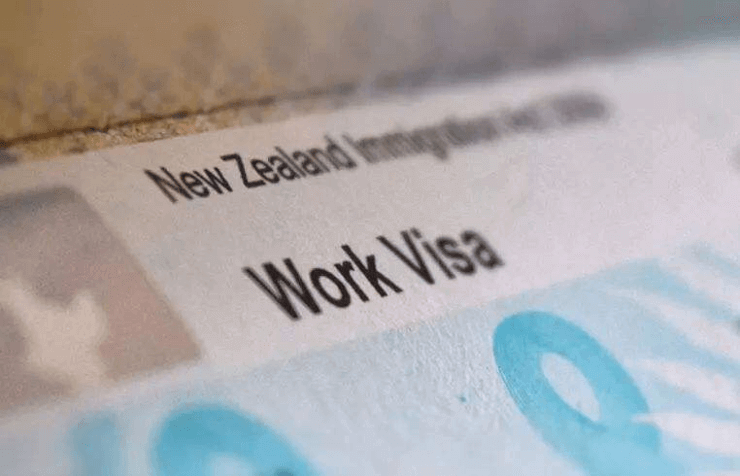Job Seeker Visa For New Zealand
In order to secure a position with a licensed employer in New Zealand, a job seeker visa policy is the best way. In this article we will try to understand the visa policies and help you choose the right way according to your situation.
A job seeker visa allows you to find a job while studying in New Zealand. Whether you’re planning to work part-time, full-time or simply just looking for new opportunities, a job seeker visa is an excellent way to support yourself financially while you focus on becoming more fluent in the English language.
Job Seekers New Zealand Visa is for the applicants who want to work in New Zealand and get a residence for the process of gaining employment. A visit visa or tourist visa does not help you in getting a work permit or a work visa. You must carry all the supporting documents including IELTS score, copy of passport and bank statements, medical insurance documents etc., if you apply for this visa. You will be given only three months to search and get the job that can help you to stay longer in New Zealand.
Take out time to visit our catalog right here on Touriangle for prompt information on New Zealand immigration jobs, 2 year work visa New Zealand, New Zealand work visa cost, New Zealand work visa application form, and so much more. You don’t want to miss this!

Job Seeker Visa For New Zealand
The New Zealand job seeker visa is designed to help international job seekers achieve New Zealand residency through gaining employment. It is primarily used by skilled workers and should be approved if the applicant meets the conditions.
New Zealand has more than 80 types of visas, though most are country-specific. With so many options, it’s often difficult to choose the right type of New Zealand work visa for your needs. If you don’t know what type of work permit your employees need or how to get it, turn to Globalization Partners.
Types of Work Visas in New Zealand
Your employees have almost limitless options when it comes to obtaining a New Zealand work visa. That said, a few of the most common visa types include the following:
- Work visa
- Student visa
- Group visitor visa
- Visitor visa
- Dependent child resident visa
- Partner of a New Zealander resident visa
- Essential skills work visa
- Working holiday visa
- Silver fern job search visa
Some of these visa types fall under the eVisa category. Instead of sending in their passport, applicants will instead get an electronic visa that they can find in the immigration electronic system. This solution replaces a physical sticker or passport stamp.
Keep in mind that all of New Zealand’s work visas are temporary — even the options that can lead to permanent residency. However, the visas labeled as “temporary” refer to those that do not help applicants eventually gain permanent residence.
New Zealand Work Visa Requirements
Unless specifically stated otherwise all applicants for work visas must:
- be bona fide applicants and
- be of good health and character.
In their work visa application they must produce evidence to show that:
- they are suitably qualified by training and experience to do the job they have been offered; and
- they can meet any of the necessary requirements to obtain full or provisional New Zealand registration; or
- they have an offer of employment and evidence from the New Zealand Medical or Dental Council that they are eligible for registration subject only to attending a personal interview with a Council representative within one month of their arrival in New Zealand
Since New Zealand has so many different types of work visas, applicants must make sure they follow the right requirements, fees, and procedures for their specific visa. In general, they will need proof of:
- Identity, including a certificate of identity, a passport, or two acceptable visa photographs
- Good health, demonstrated by a chest x-ray, health questionnaire, and medical exam after arrival
- Good character, shown by submission of a character questionnaire and police certificates from the individual’s country of origin as well as any place they’ve lived for at least five years since they turned 17
- Good faith
Some New Zealand working visas are subject to a points scale, which applicants are awarded based on certain qualifications. The country’s immigration website has a simulation that allows people to test whether they meet the required points to apply. Once they do apply, an immigration officer will assign the points during the visa assessment.
New Zealand Work Visa 2022
If you want to work during your stay in New Zealand, you will have to obtain a work visa.
There are four different pathways you can choose from when applying for a work visa:
- The skilled stream;
- The family stream;
- The international/humanitarian stream; and
- The special work stream.
Skilled stream
Skilled migrants have a broad range of options available for their work visa application process:
- Work to residence
- Essential skills
- Specific purpose or event
- Students/trainees
- ‘Work to Residence’ for migrants whose skills are in demand – provides them with a pathway to residence.
- ‘Essential skills’ facilitates the entry of people required on a temporary basis to fill shortages where New Zealanders are not available for the work offered.
- ‘Specific purpose or event’ for migrants who have demonstrated skills, expertise or attributes that are likely to benefit New Zealand, where there is no risk of negative impact on opportunities for New Zealanders.
- ‘Students and trainees’ for students and trainees to gain practical work experience or to train as part of their studies.
Family stream
The Family stream enables partners of visa holders to undertake temporary employment in New Zealand:
- partners of New Zealand citizens or residence class visa holders, and partners of Long Term Business Visa holders, whose ultimate intention is likely to be to apply for residence; and
- partners of holders of work visas.
International/Humanitarian stream
The International and Humanitarian stream consists of:
- working holiday schemes to allow people from other countries to be granted permission to work on a reciprocal basis; and
- provisions to enable New Zealand to meet its humanitarian and international obligations.
Special work policies stream
The special work stream consists of:
- horticulture and viticulture seasonal work visas
- foreign crew of fishing vessels visas
- religious worker visas
The horticulture and viticulture seasonal work instructions facilitate the entry of seasonal workers to support the horticulture and viticulture industries
The foreign crew of fishing vessels instructions provide for the grant of work visas to foreign crew employed on fishing vessels in New Zealand’s fisheries waters
The religious worker instructions enable the entry of workers to undertake genuine religious work in New Zealand, providing New Zealand communities with the opportunity to practice, maintain and advance their religious beliefs.
Application Process
Applicants can complete much of the New Zealand work visa application process through the country’s immigration website. The process is typically fast and easy, and it shouldn’t take more than 15 minutes. However, individuals can apply in person by submitting the form and necessary documents to the corresponding receiving center.
Someone will send a notification if the individual will receive an eVisa. The process of gaining an eVisa usually requires the applicant to open an account with the immigration website and finish the application process. We recommend printing out the eVisa letter and carrying it while living and working in New Zealand.

Working Holiday Visa New Zealand
New Zealand has working holiday scheme agreements with many countries, allowing you to work in and explore our great country.
Every year hundreds of young people apply for New Zealand working holiday visas, and spend a year or two working in New Zealand.
Eligibility and criteria for working holiday visas
Working holiday visas are available to young people, usually aged 18 to 30, but 18 to 35 in a select few countries. They let you travel and work in New Zealand for up to 12 months, or 23 months if you are from the UK or Canada. If you apply for a 23-month visa, you must provide a General Medical Certificate.
Employment conditions
You cannot accept a permanent job offer while on a New Zealand working holiday visa. Employment conditions vary between the different countries. Check the details for your country’s working holiday visa scheme.
Studying and training courses
With your working holiday visa you can study one or more courses for up to 6 months in New Zealand. For example, you could study English for up to 6 months, do a Study Abroad programme for up to 6 months, or a short training course in New Zealand.
NOTE
You need to:
- have enough money to pay for a return ticket, and
- be coming mainly to holiday, with both work or a short amount of study your secondary intentions.
Changes to working holiday schemes for 2022
On 21 August 2022, the New Zealand Government announced changes to help increase access to working holiday makers already in New Zealand, and those looking to travel to New Zealand. This means that more people can come to visit and work in New Zealand.
New working holiday visas for people outside New Zealand whose visa has expired
An additional opportunity is being provided for those who previously held a Working Holiday Visa but were unable to travel here due to border restrictions. If eligible you will be granted a new visa that will allow you to enter New Zealand from 26 October 2022.
You will be able to view your new visa through our Visa Verification Service.
The new visa will give you a further 3 months to enter New Zealand. You will have until 23.59 Friday 31 January 2023 (NZDT) to enter New Zealand. The new visa will allow you to work in New Zealand in any temporary role for any employer (excluding permanent work) for 12 months from your first arrival. The new visa will allow you to make multiple entries in and out of New Zealand.
Capped schemes will double for 2022
The caps for the capped working holiday schemes will double for 2022. Capped schemes which have not yet filled for the year had their cap doubled on 8 September 2022 and remain open. Other schemes have a specific re-opening date which can be found below.
Reopening dates for capped working holiday schemes
The below table has information about the re-opening dates and extra places for capped working holiday schemes that have already filled and closed, or are close to being filled for 2022.
| Country | Re-opening date | Extra places to be added on re-opening |
|---|---|---|
| Malaysia | 8 September 2022 | 1150 |
| Uruguay | 13 September 2022 | 200 |
| Argentina | 15 September 2022 | 1000 |
| Chile | 22 September 2022 | 940 |
| Taiwan | 29 September 2022 | 600 |
| China | 11 October 2022 | 1000 |
| Hong Kong | 18 October 2022 | 400 |
| Brazil | 20 October 2022 | 300 |
| Vietnam | 25 October 2022 | 100 |
| Mexico | 27 October 2022 | 200 |
| Philippines | 1 November 2022 | 100 |
| Hungary | 3 November 2022 | 100 |
| Slovakia | 8 November 2022 | 100 |
| Austria | 10 November 2022 | 100 |
| Poland | 15 November 2022 | 100 |
| Lithuania | 17 November 2022 | 100 |
| Peru | 22 November 2022 | 100 |
| Turkey | 24 November 2022 | 100 |
| Spain | 29 November 2022 | 200 |
| Portugal | 1 December 2022 | 50 |
Capped schemes with open spaces that doubled on 8 September 2022
The below table has information about capped working holiday schemes that still have open spaces. The cap for these schemes doubled on 8 September 2022.
| Country | Extra places added on 8 September 2022 |
|---|---|
| Korea | 3000 |
| Czech | 1200 |
| Singapore | 300 |
| Israel | 200 |
| Estonia | 100 |
| Slovenia | 100 |
| Latvia | 100 |
| Thailand | 100 |
| Croatia | 100 |
| Luxembourg | 50 |
| Malta | 50 |
Other Important Considerations
Some work permits in New Zealand operate under a quota system. Tight deadlines and limited spots can make it difficult to get what you need when you need it. If there is a set quote, applications will open on a specific day — often 59 days from the application date. Once every country reaches its quota, an applicant can’t apply again until the following year. Some countries have unlimited quotes, such as Canada, the UK, and Japan, but some others have a quota as low as 50.


